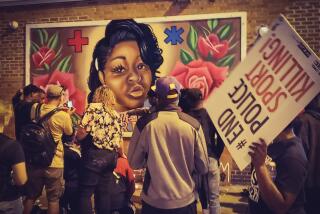Malawi Police Reportedly Kill Protesters : Africa: Human rights group discloses 20 slayings, says country ‘is proof that repression can work.’
- Share via
NAIROBI, Kenya — In possibly the worst outburst of government violence in decades in a country considered a model of tranquillity, police officers in Malawi reportedly opened fire on a group of demonstrators in Lilongwe, the capital, killing as many as 20 people.
The incident occurred last March but, characteristically, has not been reported until recently in Malawi or abroad. It was disclosed in a report by Africa Watch, a human rights monitoring group, and confirmed this week by sources in Malawi.
The Lilongwe shootings have not been mentioned at all by the government-owned Daily Times, Malawi’s only newspaper, even though the incident apparently led to the dismissal or reassignment of the Lilongwe regional police commissioner. The only two foreign correspondents stationed in the country, both working for European news agencies, had been expelled earlier in the year.
Malawi’s press is government-owned and tightly controlled, yet even normally compliant editors of the Daily Times have been arrested on occasion and jailed for years for inadvertent departures from the official line.
“The local press must be considered among the most slavishly conformist in the world,” the Africa Watch report said.
Malawi’s government has long been regarded as one of Africa’s most pro-Western, largely because of the orthodox anti-communism of President H. Kamuzu Banda, but the government’s repressive character has been getting more attention recently.
“Malawi is proof that repression can work,” Africa Watch said, referring to the country’s veneer of serenity and political docility. No active opposition is known to exist in the country, even underground.
Banda, an American-trained physician who is believed to be older than 90 and holds the title “life president,” is one of Africa’s most inflexible rulers. Several of his political opponents have been assassinated, including one whose home was firebombed last year in the neighboring state of Zambia. Ten people died, including two wives and several children of the target, a Malawi journalist named Mkwapatira Mhango.
In 1983, three Cabinet ministers and a member of Parliament, including a prospective successor to Banda under the Malawi constitution, died mysteriously. Their bodies were found in a wrecked car in a rural area and the deaths were ruled accidental. But witnesses said the bodies were riddled with bullets, and the wife of one victim had been informed by police of his death before the car was found.
The Banda regime thoroughly controls what Malawians can read or write. The Malawi Censorship Board has placed thousands of books and periodicals on a prohibited list, ranging from Playboy magazine to the works of George Orwell, James Baldwin, Ernest Hemingway and the Nigerian Nobel laureate Wole Soyinka.
The list is so extensive that at one point Banda commended to the Cabinet a book he had been given as a gift during a visit to his American alma mater, Meharry Medical College in Tennessee, only to discover that it had been banned. Also banned is the Simon and Garfunkel song “Cecilia,” apparently because this is the name of Malawi’s “Official Hostess,” Cecilia Kadzimira, Banda’s former medical secretary and full-time companion.
Several of Malawi’s leading literary figures have been exiled or jailed, including Jack Mapanje, the only Malawi poet who has acquired an international reputation. Mapanje, who was chairman of the English department at the University of Malawi, was arrested in 1987. He remains in prison, though never formally charged.
Over the years, the Banda regime has persecuted Jehovah’s Witnesses for their refusal to buy membership cards in the Malawi Congress Party, the sole political party, and Indian and Pakistani merchants, who are forbidden by law to own or occupy property anywhere but in the three major cities.
Public demonstrations like the one that provoked the police shooting in Lilongwe in March are exceedingly rare. This episode, according to witnesses, was provoked when a local businessman beat to death an employee for alleged theft.
Angered by police failure to prosecute the businessman, a crowd gathered around an ambulance carrying the victim’s body to a mortuary on March 18 and began stoning the police guard. In firing into the crowd, the police reportedly killed several protesters as well as innocent passersby.
According to Washington sources, the incident will be mentioned in this year’s U.S. State Department report to Congress on human rights in countries receiving U.S. foreign aid. This is considered likely to further damage Malawi’s human rights image in the eyes of American diplomats, who have previously criticized the regime for its incarceration of Mapanje and for other human rights violations.
Nevertheless, the State Department has requested a foreign aid budget of $25 million for Malawi this year, up from $21.5 million last year. In January, Malawi managed to get $40 million of its debt to the United States canceled, based on its compliance with an austerity program imposed by the World Bank and International Monetary Fund.
More to Read
Sign up for Essential California
The most important California stories and recommendations in your inbox every morning.
You may occasionally receive promotional content from the Los Angeles Times.










